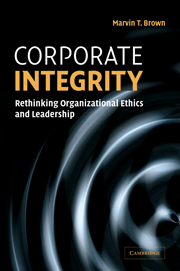Book contents
- Frontmatter
- Contents
- Preface
- 1 The context for corporate integrity
- 2 Cultural integrity as openness
- 3 Interpersonal integrity as relational wholeness
- 4 Organizational integrity as pursuing a worthwhile purpose
- 5 Social integrity as civic cooperation
- 6 Environmental integrity as natural prosperity
- 7 Corporate integrity and organizational leadership
- Appendix: Assessment worksheets
- Bibliography
- Index
5 - Social integrity as civic cooperation
Published online by Cambridge University Press: 05 September 2012
- Frontmatter
- Contents
- Preface
- 1 The context for corporate integrity
- 2 Cultural integrity as openness
- 3 Interpersonal integrity as relational wholeness
- 4 Organizational integrity as pursuing a worthwhile purpose
- 5 Social integrity as civic cooperation
- 6 Environmental integrity as natural prosperity
- 7 Corporate integrity and organizational leadership
- Appendix: Assessment worksheets
- Bibliography
- Index
Summary
The previous chapter concluded that a corporation's purpose depends on its place in larger social systems. The purpose of automobile companies, for example, depends on the transportation system in which they exist. Corporations, of course, are not the only agents in these systems. Social systems also contain nonprofit corporations and government agencies. So how should these different agencies relate to each other? The idea that corporations should cooperate with communities and governments has become a standard requirement of corporate citizenship. This chapter examines what cooperation would entail in the context of cities or city regions.
Although many people would agree that corporations should cooperate with various public agencies, they would not agree about the best way to talk about it. As we have seen already in previous chapters, some people make the “business case,” which argues that doing good will result in doing well. Others make a case based more on reciprocity. Corporations should give something back to society for providing them with resources such as an industrious population, an educated workforce, or even the social infrastructure necessary for corporations to exist. A third argument, which was mentioned in Chapter 1, is that corporations should act as citizens. This idea has been more popular in Europe than elsewhere, but it seems to be spreading. Is this the best way to talk about corporate cooperation with public agencies? The previous strategy of using our understanding of nonprofits to shed some light on our understanding of for-profits can help answer this question.
- Type
- Chapter
- Information
- Corporate IntegrityRethinking Organizational Ethics and Leadership, pp. 131 - 160Publisher: Cambridge University PressPrint publication year: 2005



